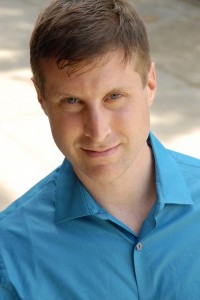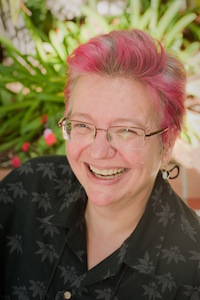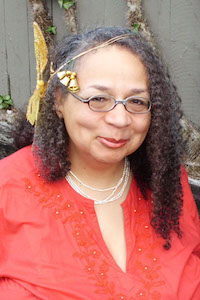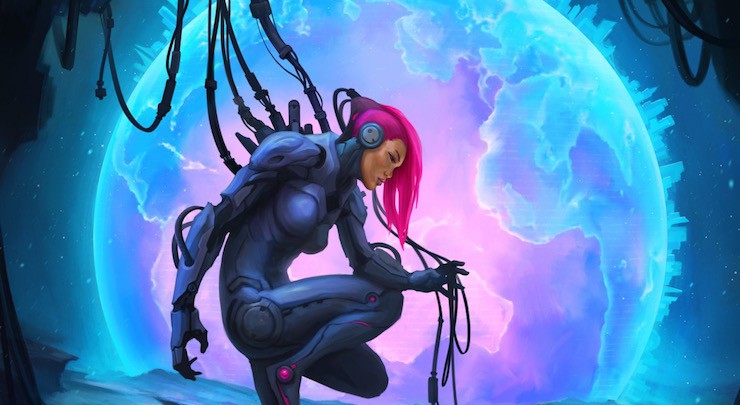Cyberpunk. It’s about cybernetics, neuroscience, nanotech, and transhumanism—and much more than that. The upcoming anthology from Hex Publishers, Cyber World, looks at how the technological changes we all face have inspired new stories to address our fears, hopes, dreams, and desires. All this as Homo sapiens evolves—or not—into its next incarnation.
Some of the most talented science fiction writers of today contributed to Cyber World, which presents diverse tales of humanity’s tomorrow. Today six of those authors answer the question “What are the best and worst aspects of cyberpunk, as either a reader or a writer?” Read their answers and tell us your own thoughts in the comments!
Madeline Ashby
 Madeline Ashby is a science fiction writer and futurist living in Toronto. Her latest novel is Company Town, available now from Tor Books.
Madeline Ashby is a science fiction writer and futurist living in Toronto. Her latest novel is Company Town, available now from Tor Books.
The hardest thing for me writing cyberpunk is the intimidation factor. There’s a heaping helping of Impostor Syndrome every time I put my fingers to keys knowing I’m participating in the same genre that so many of my favourite writers established around the year I was born. Science fiction is older than all of us, but there’s something special (and especially daunting) about participating in a conversation that’s been going on for just about as long as you’ve been alive. It takes on a different weight.
The only way around this is to forget I’m writing cyberpunk at all. All I’m doing is writing a story set in a particular future. One of the nastiest things for writers (and all artists and creators) about what’s called “the tyranny of minor differences” is that once you commit to a sub-genre, you commit to a checklist. Sometimes that checklist is really fun — it’s like to-do list of ways to hack or fuck or subvert genre expectations. But other times, a checklist can feel like drudgery: Do people know it’s cyberpunk? Have I put in enough mirrorshades? What about neural implants? What about depictions of cyberspace? Have I invented my own pidgin? Am I being too obvious? Am I explaining too much?
In the end, a good story is a good story. I certainly wouldn’t send in an epic fantasy story to a cyberpunk anthology (speaking of genre expectations!), but I might send it if I can build a SF frame around it. If the characters are strong and the world is developed and something actually happens between the pages, it’s a good story, no matter what the genre. These are basic Aristotelian unities. (Aside from his 24 hour rule. His 24 hour rule is horseshit.) So I try to focus on doing that job right, first, and doing everything else second.
Stephen Graham Jones
 Stephen Graham Jones’s latest novel is Mongrels (William Morrow, 2016)
Stephen Graham Jones’s latest novel is Mongrels (William Morrow, 2016)
I’ll start with what’s worst. And that’s got to be that everybody keeps insisting that cyberpunk is dead, right? And everybody here, each time you sit down to write a cyberpunk story, they’re right there over your shoulder, whispering Do you smell that? Is something rotting, decaying? Wait, are you actually sitting there poking it? What kind of morbid fascination is that? Like Jon says, though, nothing ever ends.
Also, truthfully, just to get me kicked out of the club? I’m not just crazy about that name, ‘cyberpunk.’ That prefix kind of locks the whole genre to a certain brief era, and ‘punk,’ it was an ethos that maybe fit back in the wild west days of the internet, where everywhere you turned there was another alt_frontier. But I don’t feel punk when I’m writing inside the server. I feel like you maybe should when writing science fiction—Did I just luck onto the way it’s really going to be? Quick, I’ve got to tell everyone!—but I don’t feel much like I’m undercutting some more normal, upper world. Maybe I’m even bolstering it or helping invent it, the same way Snowcrash is supposed to have been thrown down on all the conference-room tables in Silicon Valley as a sacred text smuggled back from the future.
Joe Lansdale told me once that back in the nineties people kept trying to rope him into being splatterpunk, since a lot of what he was doing was pretty much splatterpunk. But he says he did everything he could to duck that label. Not because he didn’t like the genre, the mode—what’s not to like with splatterpunk?—but because he knew that things moved in cycles, and that once splatterpunk started into the retrograde part of its life, he’d then be sliding down with it. I mean, that hasn’t happened to Gibson, of course, but he’s had to fight and claw against it, too. Doesn’t he say—I think this is him—that on the panel where someone first said ‘cyberpunk,’ he did everything he could to resist it? Probably for the same reasons Lansdale resisted splatterpunk. Smart writers do smart things, I suppose.
What’s best about cyberpunk, it’s that this space you’re writing in actually and really feels like the next step. Everybody out there pointing and clicking, everybody burrowing into their terminal windows and hot-wiring motherboards and just plain old having Tron-dreams. Let’s say their combined sense of digital reality, it’s X-wide. Some radius that has no number. Just a big pool of ‘this is the world, this is real.’ When you’re writing cyberpunk, though, you’re out past the edge of that just a bit. You’re writing in the shadows, you’re scooping up primordial matter and you’re massaging it into unguessed-at shapes, and then shooing it back into the world. Usually, of course, those new animals, they die, they shrivel in the light, shrieking, the Birds of the Real come down for them hard. But every once in a while, right? Every once in a while, you’re standing out there in the shadows of this X+1 space, and you watch this new and delicate animal stop there in the real, take a bearing, and then scurry out into it, embedding itself deeper than anyone will ever be able to find. That’s what writing cyberpunk feels like for me. It’s easy to get addicted to, too. People who prefer nonfiction to fiction, because fiction is all made up? Maybe this would appeal to them, as—and I feel confident about this—cyberpunk is not happening in some ‘safe,’ made-up space. Cyberpunk impacts the real and actual world. The new currency is information, right? And information, even information encased and encoded with narrative, it doesn’t need any organic conduit to get proper-born. It just needs a mind to engage it.
Matthew Kressel
 Matthew Kressel’s latest novel, Queen of Static, the follow-up to King of Shards, will be out in October. You can find him on Twitter.
Matthew Kressel’s latest novel, Queen of Static, the follow-up to King of Shards, will be out in October. You can find him on Twitter.
Today we’re on the cusp of a second great technological transformation akin to the mass adoption of personal computers in the 80s, except now the tech is VR, wearables, and AI. The visionary science-fiction writers of the 80s imagined what the emergence of such tech might bring, thus: Cyberpunk.
But what was science fiction in the 80s has since become fact? YouTube has a VR channel. Amazon.com delivers packages by drone. People wear computers on their wrists. The NSA listens to every byte crossing the world. People regularly interact with AIs. The changes have been so subtle many of us have not noticed how thoroughly technology has penetrated our lives. Like the proverbial lobster in a pot, technology has slowly raised the temp of mass culture so that in a thousand ways we’re already living in a Cyberpunk age. But in the next decade the changes will be so profound they will be impossible to ignore.
There won’t be a Singularity, capital ‘S’, as much as a wave of rapid paradigm shifts altering mass culture. And among all the genres of science fiction — and really, all forms of communication — only cyberpunk has the language to describe them.
When at its best, cyberpunk serves as a guide. Its stories are visionary, cautionary, and enlightening. They reveal to us potential futures and warn us against technology that suppresses, divides, and alienates. But at its worst, cyberpunk is an inkblot on our imagination. Its vision of rain-swept, neon-lit, urban dystopias has dominated science fiction’s visual landscape for decades, drowning out other potential, more optimistic imaginings of the future. We must be cautious to not see its more dire predictions as roadmaps, but see them as hazard signs, paths to be avoided, not emulated.
But cyberpunk will continue to anticipate the future in ways other genres can’t, simply because it has been exploring the implications of rapid technological change for decades. We’ve been hurtling into a cyberpunk world for a long time now.
Cat Rambo

Cat Rambo is the current President of the Science Fiction & Fantasy Writers of America. Her most recent novel is Beasts of Tabat.
The worst aspect of cyberpunk is the way it’s been commercialized and turned inside out, made into a smartphone skin rather than a question. The word “punk” holds more meaning than a hairdo or a ragged hem, but advertising’s plucked a lot of that meaning from it. Part of that transformation is the inevitable impact of film and its emphasis on appearance. Bladerunner/Do Androids Dream of Electric Sheep’s a great case study in how film can gulp a text down and then produce a vision of it that is intense and beautiful, but whose depth depends on the angle from which you’re viewing it.
In its best aspect, cyberpunk was a cultural critique, a way of taking the glossy visions of the future that multinational corporations want to sell us and deconstructing them by looking at the economic systems and oppressions necessary to maintain such facades. It produced brilliant works, works filled with the sort of humor, sorrow, and mix of cynicism and heart that is necessary for survival in modern times. Some of them posited revolution; some of them managed to shape their future, our present, and continue to do so.
Nisi Shawl

Nisi Shawl is the co-editor of Locus Award finalist Stories for Chip: A Tribute to Samuel R. Delany and author of Everfair, a Belgian steampunk novel due out from Tor in September 2016.
That’s a four-part question, isn’t it?
Let’s start with the worsts. The worst aspect of cyberpunk for a reader is the sexism laced all through and through the original canon—the writing that dates from the term cyberpunk’s invention. Debate all you want over whether that sexism was intentional. I happen to think it wasn’t—that Sterling, Gibson, et al. were doing what they wanted to do in all their own boyish magnificence, but that they also expected and wanted and lobbied for girls to join in the fun. Pat Cadigan sure did, and I know of at least one other woman who can testify as a first-hand witness to early cyberpunk’s welcoming atmosphere.
Though in some cases the oeuvre modeled itself on the notoriously sexist noir genre—so Philip Marlowe-like knight-errantry manifested itself all too easily in this milieu—other cyberpunk works ignore such conventions: Sterling’s Islands in the Net, for example, with a thirty-two-year old mother of a newborn as its protagonist.
Nonetheless, reading vintage cyberpunk novels and stories can irritate one’s gender-oppression membranes, which have probably already been sensitized by living in this period of late-capitalist patriarchy.
The worst thing about cyberpunk from a writer’s perspective is that someone else already came up with it. For instance, I will not be the first person to compare the color of an overcast sky to a television tuned to a dead channel.
The best thing for readers of cyberpunk? There’s a lot of the stuff to read, if you know where to look. So much is new, too, like David J. Williams’s Autumn Rain Trilogy—and, of course, the anthology I and the other authors talking about these questions contributed to, Cyber World.
Best best for last: writers can’t write the old stuff as if it were brand new, but we can haz tremendous liberty to respond to it, riff on it, extrapolate from it, update it, and even just plain ignore it. Cyberpunk’s core concerns—control of the human/machine interface, privatization of information, the perceptional boundary between reality and illusion—all continue to be valid and worthy of exploration. Now we can explore those concerns from a place of conscious intersectionality. And now we can imagine a future based on a present the past barely dreamed of. Now we can point to where we thought we’d be by this time and look beyond where we’re pointing and keep going.
Alyssa Wong
 Alyssa’s latest work is “You’ll Surely Drown Here If You Stay,” in Uncanny Magazine #10. She just won a Nebula Award.
Alyssa’s latest work is “You’ll Surely Drown Here If You Stay,” in Uncanny Magazine #10. She just won a Nebula Award.
I think one of the most challenging aspects of approaching cyberpunk as a writer is that, to me, the genre feels anchored in an era. I tend to associate it with classic works from the 1980s-90s, like Bladerunner, Neuromancer, Ghost In The Shell, and The Matrix. There are a number of aspects of cyberpunk that I enjoy, from the scifi noir feel, to questions of human flesh interfacing with disembodied technology (like the internet). But many cyberpunk works play off of the fear of losing one’s grip on ‘the real world,’ whether that means the fear of succumbing to an elaborate digital or mechanical illusion, or losing one’s humanity while living in this halfway space between the here and the digital ether. For a lot of folks around my age, we’ve already grown up fairly interfaced with the internet: our lives crisscross and traverse effortlessly from meatspace to digital space. Our friendships, voices, images are all online. At the same time, we can have real, fulfilling communities offline as well. In that sense, some of the core fears of cyberpunk feel outdated, too. We’ve been interfacing our whole lives, and it hasn’t compromised our humanity—it just makes us faster, more effective cyborgs.
But there are also aspects of cyberpunk that speak to me, both as a reader and a writer. I’m a sucker for noir, and I like that cyberpunk is essentially a weird, science fiction urban fantasy. It feels personal and accessible in a way that I really appreciate. Personal, biting stories about people pitted against powerful, corrupt power structures get to me every single time. Cyberpunk can also be a good vehicle through which to explore physical and emotional trauma. Good cyberpunk isn’t just in the worldbuilding and aesthetics; I think it’s at its best when it focuses in on just what people will do in order to survive.










